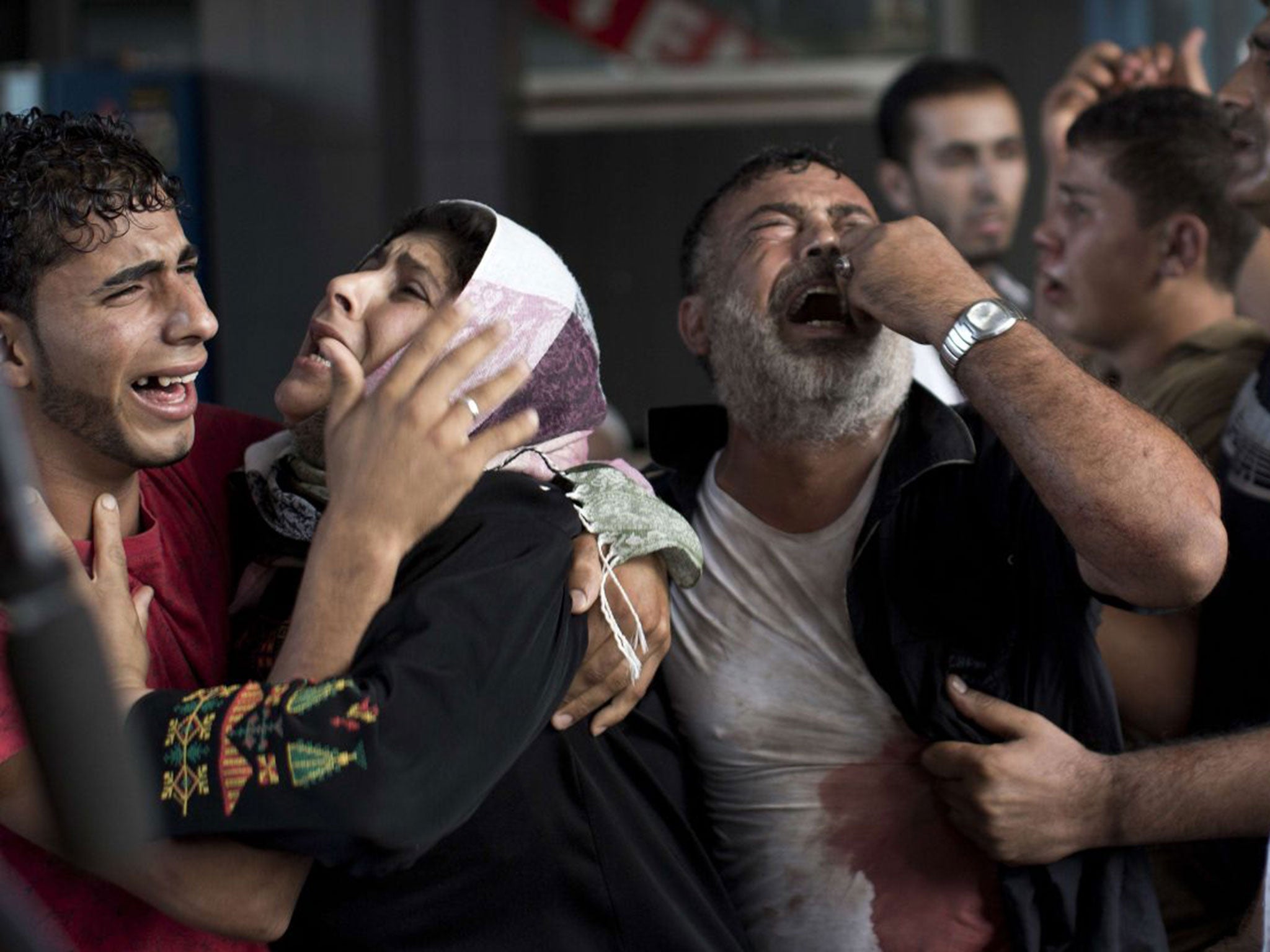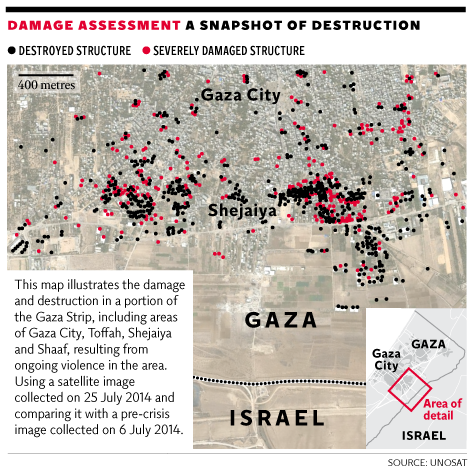Israel-Gaza conflict: The children were playing in the street with toy guns. The missiles were tragically real
Ten additions to the toll of young victims on day that nine Israelis also killed

A day which began with high hopes of peace ended in appalling bloodshed with 24 dead and the ominous prospect of a widening conflict. Ten children were killed in an missile strike in Gaza City, while, across the border, nine Israelis were killed in separate incidents.
The children were hit while playing in the Beach refugee camp, adding to the already extraordinarily high numbers of young victims in this war. The massacre came on Eid, the day of celebration after the end of the holy month of Ramadan.
The Israeli military said nine soldiers died in separate attacks – four were killed in a mortar attack and another five were killed in combat in Gaza. The fighting has already killed at least 1,050 Palestinians in total, 52 Israeli soldiers and three civilians on the Israeli side.
The air strike attack on Beach drew immediate recriminations, with the Israeli military tweeting that misdirected Hamas rockets were responsible for the carnage and also at a second site, at the Shifa Hospital in Gaza City. In fact the damage was to a clinic attached to the hospital causing some of the 46 injuries from both places. The deaths were on a street in the camp where children were playing on swings and with toy guns.
The guns had been widely seen in the streets today as Eid presents, but the children could not have been mistaken for fighters: all were aged between seven and 12 years old. Those present were adamant that they had heard aircraft overhead, accounts varying between F-16 warplanes and helicopter gunships.
Families and neighbours told The Independent that the dead were Yusuf Hassona, seven: Jamal Aliam, Mohammed Abu Shaqfa, both also seven: Mahmood and Ahmed Shubair, brothers aged seven and six: Mohammed Muqdad, eight: Bara Muqdad, seven: Mohammed Barud, seven: Ahmed Washas, 12, and Ahmed Hajaj, 12. One other boy is said to be missing.
Six of the boys had been using the swing, which had been set up for Eid, with four others waiting their turn. Anas Abu Shaqfa, seven, thought he heard a helicopter before the blast in which two of his cousins, Jamal Aliam and Mohammed Abu Shaqfa were killed. “I was not afraid, but I am very sad about my cousins; we used to play together”, said Anas.
Mohammed Barud had come with his parents to his grandfather’s house for an Eid lunch. Asma al-Muqaid, an aunt, said: “They were all playing just at the end of this alleyway. They were not in an open area where Israelis say are used for rockets; they were in front of homes.
“We heard the explosion, and then ran out to see what was going on. Mohammed was injured, but we didn’t know how badly. We contacted Shifa and we were told that he was dead. Why are the Israelis doing this? Do they want to kill all our children?”
A shallow crater on the road showed where the missile landed. There were pools of blood in one of which lay a black plastic pistol, alongside one tiny shoe. A stall which had been put up to sell snacks had been blown away, with packets of sweets and crisps lying in the gutter. The stall holder was severely injured and, according to unverified reports, died later.
Ibrahim al-Majhal, 18, who was on the street when the blast took place, recalled hearing a F-16 overhead. “It was definitely that plane, we know the noise it makes here. The missile came straight down between the children. I saw little kids cut in half; there were arms and legs lying on the road. I started running because I thought there was going to be a second missile. When that didn’t happen, I came back to help. But I could not pick up arms and legs of kids – it was too much.”
The attack came after a 24-hour truce declared by Hamas. There were sporadic hostilities while it lasted, with rockets fired into Israel and Israeli shelling to the east and north of Gaza in response. A boy of five, Jibril Janaid, was killed on the edge of Jabaliya, the biggest refugee camp in the area.
His father declared at his burial, “At the day of Eid, I am proud to sacrifice my son for the sake of victory of the resistance and the victory of the will of the Palestinian people”. The funeral was full of orations about battle and victory and little about the boy who has lost his life.

The end of the ceasefire, at two in the afternoon, passed without a major exchange of ordnance. Then, late in the afternoon, came the Beach camp killings, followed by the news of the mortar attack in Israel.
Residents in three area, Beit Hanoun, Beit Lahiya and Jabaliya had begun by the evening to receive telephone calls and text messages warning them to evacuate to Gaza City. The population of 1.7 million in an area just 26 miles long and a few miles wide is being squeezed into a tightening circle. There are virtually no places left in UN schools used as shelters in Gaza City, forcing families who have fled from their homes to sleep in tents or out in the open, bringing with it the chances of massive loss of lives in collateral damage.
Join our commenting forum
Join thought-provoking conversations, follow other Independent readers and see their replies
Comments